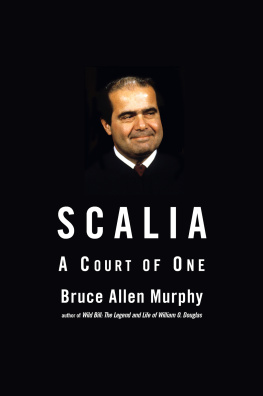THE FEDERALIST SOCIETY
THE FEDERALIST SOCIETY
How Conservatives Took the Law Back from Liberals
Michael Avery and Danielle McLaughlin
Vanderbilt University Press
NASHVILLE
2013 by Vanderbilt University Press
Nashville, Tennessee 37235
All rights reserved
First printing 2013
This book is printed on acid-free paper.
Manufactured in the United States of America
Library of Congress Cataloging-in-Publication Data on file
LC control number 2012031471
LC classification number KF294.F43A94 2012
Dewey class number 349.7306--dc23
ISBN 978-0-8265-1877-4 (cloth)
ISBN 978-0-8265-1879-8 (e-book)
For my children, Katherine, David, and Samantha.
My love for them knows no bounds.
Michael Avery
For my parents, Adam and Patti McLaughlin,
who taught me that anything is possible.
Danielle McLaughlin
CONTENTS
PREFACE
This is a book about the power of ideas. The Federalist Society has been extremely effective over the past thirty years in translating the intellectual capital of its members into law and policy. We have traced the development of the ideas of society members from articles, books, panels, and debates into legislative proposals, citizen referenda, legislation, legal briefs, court opinions, and White House policy. We have followed key Federalist Society members from law schools into private practice, public interest law firms, the Department of Justice, and the White House, as well as onto the bench. Our narrative is primarily based on what the subjects of our study have said and written, the ideas they have propagated and embraced, and the ideas that they have rejected.
We wrote this book to shine a light on the forces at play in the making of law and policy in the United States. There is much that citizens from all points on the ideological spectrum can learn from the story of the Federalist Society. We also hope, as the story unfolds, that our readers will stop to think about what they believe the Constitution stands for, how it should be interpreted, and its influence on their lives.
To do justice to the ideas and the considerable scholarship of our subjects, it is necessary to discuss in some detail political philosophy, Supreme Court jurisprudence, and legal doctrine. We have tried to explain the law and the history of legal doctrine in the Supreme Court in a common-sense way, and have tried to steer a middle course between the lengthy footnotes that legal writing demands and the dearth of footnotes often found in popular publications. To assist the reader further, we provide an explanation of how legal citations work in .
Many of the members of the Federalist Society who have had great influence over law and politics are relatively unknown to members of the general public. We supply an alphabetical list and basic information about important Federalist Society members and allies in .
We conducted the research by reviewing the voluminous written work of Federalist Society members and allies, transcripts and recordings of panels and symposia, legal briefs and court opinions, government reports, contemporary published accounts of the activities of the Federalist Society, and existing scholarship regarding the conservative legal movement. We also attended Federalist Society conferences and meetings. The society posts a great deal of the output of its members on its website (fed-soc.org), including videos of speeches and panels. We have based our analysis on the public record rather than on private interviews, with the exception of some statements that Federalist Society members have made to other researchers.
This book consists of chapters on substantive areas of law where Federalist Society members have been active, including property law, international law, privacy, race and gender discrimination, and access to legal remedies. We also discuss the success the Federalist Society has enjoyed in getting its members and other conservative lawyers appointed to influential positions in government. There are many more areas of law for which a similar analysis would yield interesting results, such as administrative law, intellectual property law, and criminal law, but we leave those for others to investigate.
We are grateful to the many people who supported and assisted us in the preparation of this book. Margaret Hagen, Brett Haywood, Katie Powell, Rebekah Provost, Dave Samuels, and Charu Verma were students at Suffolk Law School who conducted invaluable research. David Avery assisted with cite checking. Suffolk Law School legal reference librarians Diane DAngelo, Steve Keren, and Susan Sweetgall were very helpful in providing research advice and obtaining necessary materials and resources. We appreciate the critical insights provided by the lawyers and professors who read drafts of some of the chapters, including Nan Aron, Marie Ashe, Mark Brodin, Barry Brown, Lee Cokorinos, Sara Dillon, Steven Ferrey, Robert Friedman, Sheldon Goldman, Page Kelley, David Murphy, Natsu Saito, Elizabeth Trujillo, and Hazel Weiser. Helene Atwan, director of Beacon Press, and attorney Ike Williams read early drafts of the manuscript and generously gave us advice about how to proceed with our project.
Suffolk Law School provided Michael Avery with a sabbatical semester and summer writing stipends to do much of his work on the project. The staff at the Harvard Law School Library provided Danielle McLaughlin with invaluable research resources. Chip Berlet and his colleagues at Political Research Associates made their superb library available to us. We are extremely grateful for the support, assistance, and advice from our families, friends, and colleagues, who are too many to name, but to some we are especially indebted. Michael Avery would like to thank the many students in his constitutional law classes over the years whose interest in the subject was a principal motivation for doing this book. Danielle McLaughlin would like to thank Brendan Hall for his unfailing encouragement and support. Any mistakes that remain in this work are entirely our responsibility.
INTRODUCTION
Law schools and the legal profession are currently strongly dominated by a form of orthodox liberal ideology which advocates a centralized and uniform society. While some members of the legal community have dissented from these views, no comprehensive conservative critique or agenda has been formulated in this field. This conference will furnish an occasion for such a response to begin to be articulated.
Steven Calabresi, Lee Liberman, and David McIntosh, statement of purpose for A Symposium on the Legal Ramifications of the New Federalism
You are more likely to convince people of your viewpoint if they feel the other side has been given a fair hearing.
Liberman and McIntosh, in an early Federalist Society guide on how to establish campus chapters
In 1980, Steven Calabresi, Lee Liberman [Otis], and David McIntosh were young, conservative law studentsCalabresi at Yale, and Liberman and McIntosh at the University of Chicagoalienated from the prevailing political orientation of their classmates and their schools. Their professors ideologies, for the most part, reflected the dominance of liberal politics in the sixties and seventies. The New Deal, the civil rights movement, and the Great Society antipoverty programs had led to widespread faith that government could and should supply the solutions to the countrys social, political, and economic problems. Calabresi, Liberman, and McIntosh disagreed, believing that big government posed a fatal threat to individual rights and the sanctity of private property. In their view, the liberals had distorted important constitutional principles. The three law students started to raise questions.
Next page
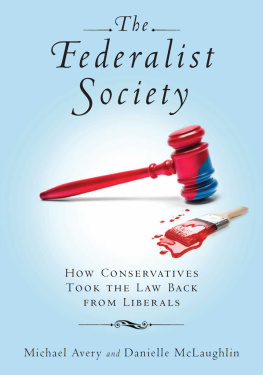
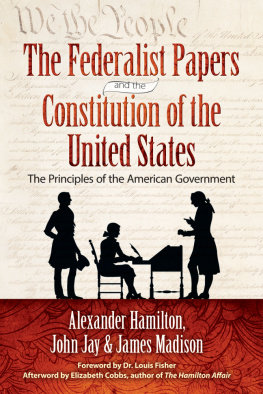

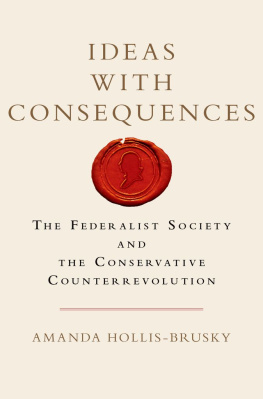
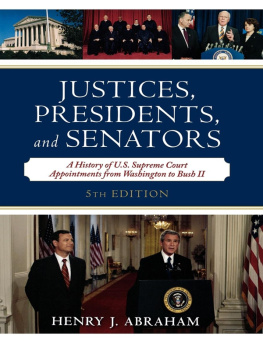
![Jay John - The Federalist : a collection of essays, written in favour of the new Constitution, as agreed upon by the Federal Convention, September 17, 1787. : In two volumes. Vol. I[-II.]](/uploads/posts/book/76130/thumbs/jay-john-the-federalist-a-collection-of-essays.jpg)

